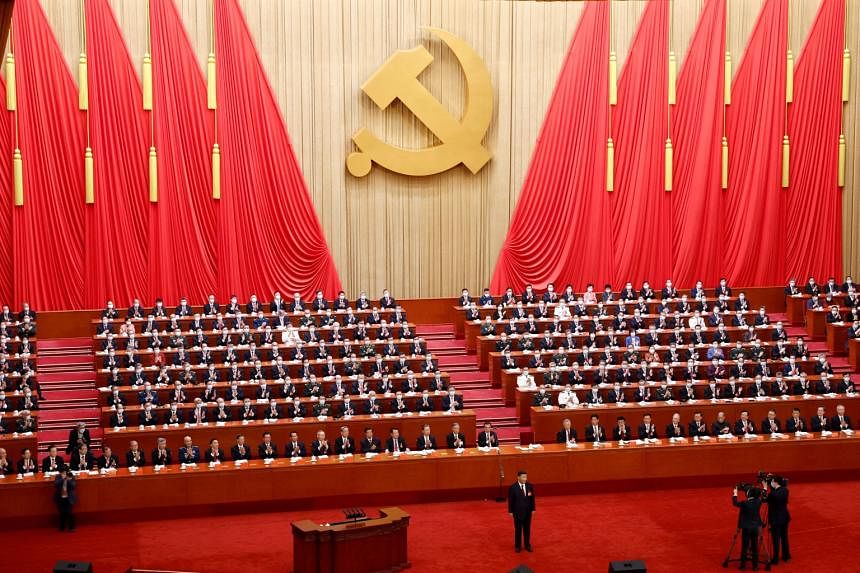China's President Xi Jinping on Sunday kicked off the Communist Party's five-yearly congress with a lengthy, wide-ranging speech summing up the ruling party's achievements in recent years and direction for years to come.
Mr Xi described the five years since the last party congress as “extremely uncommon and abnormal”, and urged his people to be prepared for danger on the horizon and to stand ready for major tests to come their way.
Here are some of the key takeaways covered in Mr Xi's speech, delivered in front of about 2,300 Chinese delegates in the Great Hall of The People in Beijing.
Covid-19
Mr Xi said China has won international praise for its approach towards the coronavirus pandemic.
China put "the people and their lives first" and achieved "significant positive results" in coordinating epidemic prevention and control, he said.
The President also said the country needed to further improve its healthcare infrastructure, set up a policy system to boost birth rates and better deal with its ageing population.
China's fertility rate of 1.16 in 2021 was below the 2.1 OECD standard for a stable population and among the lowest in the world.
Taiwan
Mr Xi said China has waged a major struggle against Taiwan separatism and foreign interference on the self-ruled island.
China regards Taiwan as a renegade province awaiting reunification with the mainland, by force if necessary. Taiwan says it will defend its freedoms and democracy.
"Resolving the Taiwan issue is a matter for the Chinese people themselves, to be decided by the Chinese people," the President said.
"We will never renounce the right to the use of force (in resolving the Taiwan issue), and will take all necessary measures to put an end to all separatist movements."
He added, however, that the party would always "respect, care for and work to benefit compatriots in Taiwan".
Mr Xi's pledge to complete the reunification of China received a lengthy round of applause from the delegates at the Great Hall.
Hong Kong
China has achieved comprehensive control over Hong Kong, turning the situation from chaos to governance, Mr Xi said, alluding to the often-violent anti-government protests that rocked the city in 2019.
It has been a "major turn for the better", he said.
Hong Kong and Macau must adhere to the "one country, two systems" policy in the long term, as it has been proven to be the best institutional mechanism for both cities, Mr Xi said.
Now, China must ensure that Hong Kong is ruled by patriots, resolve its deep-seated social and economic problems, and Beijing will support the city in its integration efforts with the mainland, the President added.
International relations & security
China opposes a "Cold War mentality" in global diplomacy, Mr Xi said.
"China... resolutely opposes all forms of hegemony and power politics, opposes the Cold War mentality, opposes interfering in other countries' domestic politics, opposes double standards," the President said, adding that Beijing "will never seek hegemony and will never engage in expansion".
Mr Xi said that while China has become a major global trading partner over the past years, it would not engage in "expansionism" and would remain committed to its broad policy of opening up its economy to the outside world.
On defence matters, the Chinese leader said the party aims to "build a strong military in the new era" to achieve a strategic deterrent capability.
He pledged a new look and new structure for the People's Liberation Army, with more advanced equipment, technology and strategic capabilities.
“We must strengthen our sense of hardship, adhere to the bottom-line thinking, be prepared for danger in times of peace, prepare for a rainy day, and be ready to withstand major tests of high winds and high waves,” Mr Xi said.
He mentioned “safety” or “security” 73 times, compared with 55 times in 2017, according to state news agency Xinhua’s transcripts. By comparison, hr said “reforms” 16 times in the televised speech, far fewer than the 70 mentions five years ago.
Development & economy
Development is China's top priority, Mr Xi said, as he exhorted the country to focus on high-quality development and expand domestic demand to advance the Chinese economy.
China will combine creating domestic demand with supply-side structural reforms as it quickens the pace of developing its dual-circulation economic strategy, he said.
The Chinese economy has been forecast to grow by around 3 per cent this year, hampered by the country's Covid-Zero policies, weak consumer confidence and lower investment. Pre-pandemic growth predictions of more than 5 per cent over the next decade now look out of reach.
Mr Xi hailed China's scientific and technological development in recent years, including pharmaceutical breakthroughs and space exploration.
"Technology is the prime production force, talent is the prime resource and innovation is a prime driving force," he said, stressing the importance for China to become technologically self-reliant.
In his speech, Mr Xi also highlighted China's achievements in poverty alleviation, one of the party's two centenary goals.
He said China would promote its "common prosperity" strategy, boosting the size of the middle-income population while standardising income distribution.
China would also set up a housing system that ensures supply from various avenues and provides support from different channels to encourage both rentals and purchases, he said.
Environment
Mr Xi vowed to prioritise the environment, to protect nature, and promote green lifestyles.
Touting an "energy revolution", he pledged to eliminate heavy air and water pollution, bring soil contamination under control, and to use coal in a cleaner and more efficient manner.
Society & culture
Mr Xi stressed the importance of a strong "socialist" culture in China, the need to propagate it among the younger generation, and to promote the "China story" to the rest of the world.
Beijing would deepen patriotic education and guide religion towards compatibility with its socialist society, he said.
The party's firm control over ideology and the media contribute to social stability, he added.

